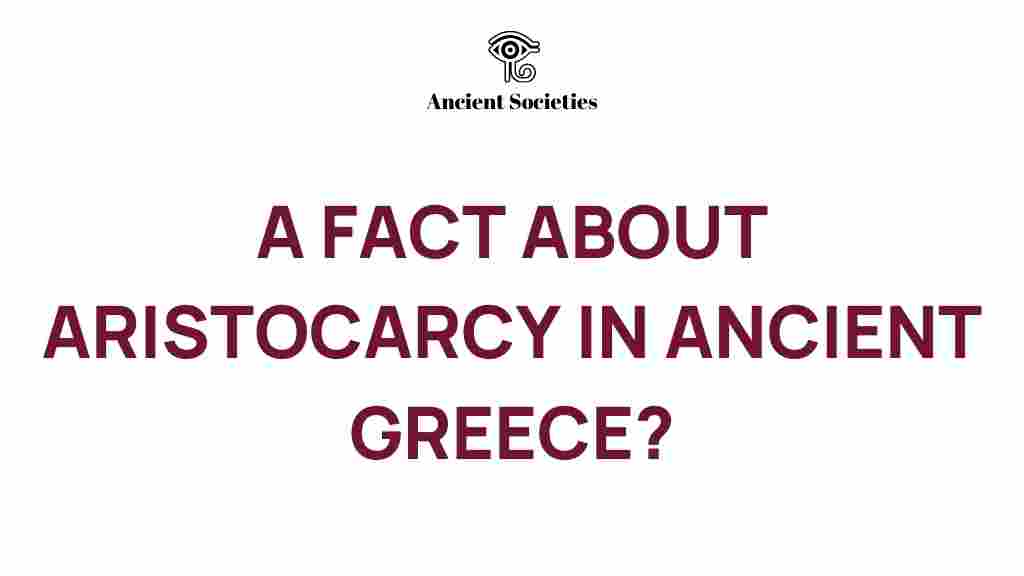Unraveling the Mystique of Aristocracy in Ancient Greece
The concept of aristocracy in Ancient Greece has long intrigued historians, political scientists, and cultural enthusiasts alike. This elite class played a pivotal role in shaping the social structure and governance of Greek city-states, influencing everything from political power to cultural legacy. In this article, we will delve into the depths of aristocracy in Ancient Greece, exploring its historical influence, the intricacies of the social structure, and its eventual transition towards democracy.
The Social Structure of Ancient Greece
The social structure of Ancient Greece was complex and stratified, comprised of various classes that included free citizens, non-citizens, and slaves. At the top of this hierarchy was the aristocracy, a group of wealthy landowners who wielded significant political power and social influence. Understanding this structure is essential to grasp the dynamics of governance in Ancient Greece.
The Aristocratic Elite
Aristocrats in Ancient Greece were often defined by their wealth, land ownership, and noble lineage. They were typically involved in politics, military affairs, and cultural patronage. Here are some key characteristics of the elite class:
- Wealth and Land: Aristocrats owned large estates and held significant agricultural resources.
- Political Influence: They often held key positions in government, such as archons and council members.
- Cultural Patronage: Aristocrats funded artistic and intellectual pursuits, contributing to the cultural legacy of Greece.
Classes Within the Social Structure
The social structure of Ancient Greece can be broadly categorized into several classes:
- Aristocracy: The elite class with political power and wealth.
- Free Citizens: Citizens who were not aristocrats but had rights and responsibilities in the city-state.
- Metics: Resident aliens who did not have full citizenship but contributed economically.
- Slaves: Individuals who were owned and had no political rights.
This stratification created a unique dynamic within Greek society, where the aristocracy often sought to maintain its status while free citizens began to push for more democratic governance.
Political Power and Governance
Political power in Ancient Greece was heavily influenced by the aristocracy. Their control over resources and military forces enabled them to shape the governance of city-states like Athens and Sparta.
The Role of Aristocrats in Governance
Aristocrats played several vital roles in the governance of Ancient Greece:
- Military Leadership: Many aristocrats were military leaders, commanding armies and defending their city-states.
- Legislative Authority: They participated in councils that drafted laws and made significant political decisions.
- Judicial Power: Aristocrats often held judicial authority, resolving disputes within their communities.
The Transition to Democracy
The power of the aristocracy began to wane in the 5th century BCE, particularly in Athens, as the demand for a more inclusive political system grew. This shift towards democracy marked a significant turning point in Ancient Greek governance.
Key factors that led to this transition included:
- Economic Changes: The rise of trade and commerce allowed non-aristocrats to accumulate wealth and influence.
- Social Movements: Increasing discontent among the lower classes led to calls for greater political representation.
- Philosophical Ideas: Thinkers like Socrates and Plato began to explore concepts of justice and governance, influencing public opinion.
Historical Influence of Aristocracy
The aristocracy in Ancient Greece not only shaped their society but also left a lasting impact on the political structures of future civilizations. Their governance models, particularly in Athens, served as precursors to modern democratic systems.
Legacy of the Aristocratic Governance
The governance practices established by the aristocracy influenced several key aspects of Western political thought:
- Concept of Citizenship: The idea of civic participation and rights originated in the discussions around citizenship in ancient city-states.
- Judicial Systems: Many modern judicial practices can be traced back to the legal frameworks established by aristocratic councils.
- Political Philosophy: The writings of philosophers from Ancient Greece continue to impact contemporary political theory and practice.
Cultural Legacy of Aristocracy
The cultural contributions of the aristocracy in Ancient Greece cannot be understated. Their patronage of the arts, philosophy, and science laid the foundation for much of Western culture.
Patronage of the Arts
Aristocrats were pivotal in the development of various art forms during Ancient Greece:
- Theater: They funded dramatic performances that became central to Greek culture.
- Architecture: Many famous structures, such as temples and theaters, were built with aristocratic funds.
- Philosophy: Aristocrats often supported philosophers and schools of thought that explored governance, ethics, and human nature.
Intellectual Contributions
Their influence extended into intellectual pursuits, shaping the way knowledge was valued and disseminated in society. The contributions of philosophers like Plato and Aristotle were often supported by the aristocracy, emphasizing their role in intellectual development.
Conclusion
The mystique of aristocracy in Ancient Greece is a reflection of its profound influence on social structure, political power, and cultural legacy. While the aristocracy played a significant role in governance, their eventual decline paved the way for the evolution of democracy, reshaping not only Greece but also the future of political systems worldwide.
Understanding this historical trajectory allows us to appreciate the complexities of governance and social dynamics that have shaped human civilization. The legacy of the aristocratic elite continues to resonate, reminding us of the intricate interplay between power, culture, and society. For further reading on this topic, you can explore more historical resources.
Whether you are a student of history or simply interested in the rich tapestry of Ancient Greek society, recognizing the profound impact of aristocracy can deepen your understanding of today’s political and cultural landscapes.
This article is in the category History and created by AncientSocieties Team
